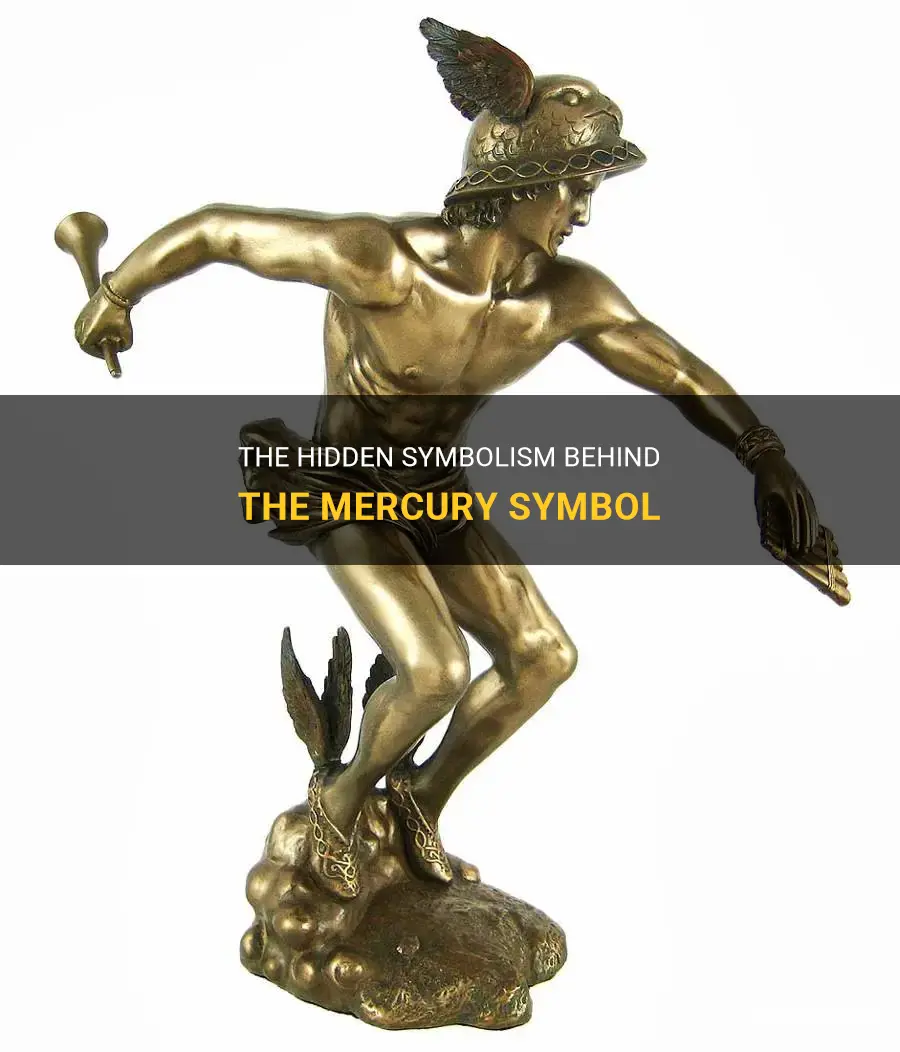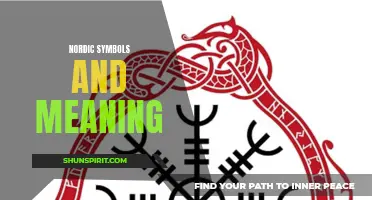
Mercury, a fascinating element and planet, has a rich symbolic meaning that transcends its physical properties. From ancient alchemical practices to modern astrology, mercury's symbol represents communication, intellect, and transformation. As the smallest and fastest planet in our solar system, mercury's symbolism reflects its dynamic and ever-changing nature. So, let's dive into the depths of the mercury symbol's meaning and explore its symbolic significance throughout history and various cultural contexts.
What You'll Learn
- What is the symbolic meaning of the planet Mercury?
- How does the symbol for Mercury represent its meaning?
- In astrology, what characteristics or traits are associated with the symbol of Mercury?
- Are there any cultural or historical associations with the symbol of Mercury?
- Does the symbol for Mercury have different meanings in different contexts, such as alchemy or mythology?

What is the symbolic meaning of the planet Mercury?
The planet Mercury holds significant symbolic meaning in astrology and ancient mythology. It is named after the Roman messenger god Mercury, who was known for his wit, intelligence, and ability to communicate swiftly. Likewise, the planet is associated with communication, intellect, and expression.
In astrology, Mercury is considered the ruling planet of Gemini and Virgo, two zodiac signs known for their analytical minds and sharp communication skills. The planet represents how we think, absorb information, and communicate with others. It governs our intellectual abilities, including logic, reasoning, and problem-solving.
Mercury's symbol is often depicted as a caduceus, a staff with two serpents intertwined around it. This symbolizes the union of opposites and represents the balance between our conscious and unconscious minds. It also signifies the ability to integrate different perspectives and find common ground in communication.
The symbolic meaning of Mercury goes beyond just communication and intelligence. It also represents adaptability and versatility. People influenced by Mercury are often quick-witted, curious, and adaptable in their thinking. They can easily adjust to different situations and effortlessly express themselves.
Mercury is also associated with trade, commerce, and transportation. Just like the god Mercury who traveled between the realms of gods and humans, the planet represents the movement of goods, services, and ideas. It influences our ability to negotiate, sell, and persuade others effectively.
In mythology, Mercury was depicted as a messenger with wings on his hat and shoes, symbolizing his swift movement. Similarly, the planet Mercury is associated with speed and agility. Those influenced by this planet often have a quick thought process and tend to excel in careers that require a fast-paced environment.
On a deeper level, Mercury represents the connection between the mind and the soul. It symbolizes our ability to express our inner thoughts, emotions, and desires. It encourages us to find our authentic voice and share our unique perspective with the world.
In summary, the symbolic meaning of the planet Mercury is vast and encompasses communication, intellect, adaptability, versatility, trade, and connection. It represents our ability to think, communicate, and express ourselves effectively. Those influenced by this planet often possess sharp intellect, quick wit, and the ability to adapt to different situations easily. Understanding the symbolic meaning of Mercury can help us tap into its energy and use it to enhance our communication skills and expression.
Unveiling the Symbolism Behind Advent’s Sacred Symbols
You may want to see also

How does the symbol for Mercury represent its meaning?
The symbol for Mercury, the smallest and innermost planet in our solar system, is a combination of the symbols for the elements of water and earth. This symbolism is significant because it reflects the characteristics and qualities associated with the planet.
The symbol for Mercury consists of a circle on top of a cross. The circle represents the element of water, which is commonly associated with emotions, intuition, and the realms of the subconscious. Water is often seen as a symbol of fluidity and adaptability, reflecting Mercury's fast orbit around the Sun and its ability to move swiftly through the zodiac.
The cross at the bottom of the symbol represents the element of earth, which is associated with practicality, stability, and grounding. Earth represents the physical and material aspects of life, as well as the ability to manifest and bring ideas into reality. This symbolizes Mercury's influence on communication, intellect, and the practical application of knowledge.
The combination of water and earth in Mercury's symbol suggests a harmony between the emotions and the physical world. It indicates the ability to think practically and communicate effectively, while being in touch with one's intuition and emotions. This symbolism is reflected in Mercury's astrological associations, as it rules over communication, intellect, learning, and expression.
Furthermore, the symbol's shape resembles the letter "H," which some believe represents the god Hermes, the Greek equivalent of Mercury. Hermes was considered the messenger of the gods, known for his speed and ability to bridge the gaps between the mortal and divine realms. This association further emphasizes Mercury's role as a communicator and messenger of knowledge.
In conclusion, the symbol for Mercury represents its meaning through a combination of the elements of water and earth. It reflects the planet's influence over communication, intellect, learning, and the practical application of knowledge. The symbol's shape also suggests a connection to the god Hermes, emphasizing Mercury's role as a messenger. Overall, this symbolism encapsulates the qualities and characteristics associated with the smallest planet in our solar system.
Exploring the Fascinating Symbolism and Meaning of Sharks
You may want to see also

In astrology, what characteristics or traits are associated with the symbol of Mercury?
Mercury is known in astrology as the planet that represents communication, intelligence, and adaptability. It is named after the Roman god Mercury, who was known as the messenger of the gods. Just like its namesake, the planet Mercury in astrological terms is associated with the ability to convey thoughts and ideas effectively.
One of the main characteristics associated with the symbol of Mercury is intellect and mental agility. People with a strong Mercury influence in their birth chart are often quick thinkers, with a sharp and analytical mind. They have the ability to grasp new concepts easily and excel in fields that require logical reasoning and problem-solving skills.
In addition to intellect, Mercury is also associated with communication skills. Those influenced by this planet have a way with words and are natural-born communicators. They possess excellent verbal and written skills, making them effective speakers, writers, and even performers. Their communication style is often dynamic and engaging, allowing them to captivate their audience effortlessly.
Adaptability is another trait associated with the symbol of Mercury. People with a prominent Mercury influence are flexible and open-minded. They can easily adapt to new situations and are quick to adjust their thinking or approach when faced with challenges. This adaptability makes them highly versatile and enables them to navigate through different social and professional environments with ease.
Furthermore, Mercury is also associated with curiosity and a thirst for knowledge. Those under the influence of this planet are lifelong learners, always eager to expand their horizons and deepen their understanding of the world around them. They have a natural curiosity that drives them to explore various subjects and gather information. This intellectual curiosity often leads them down paths of continuous growth and self-improvement.
On the negative side, people with a strong Mercury influence may sometimes struggle with indecisiveness and overthinking. They can become stuck in analysis paralysis, constantly weighing the pros and cons of different options, and finding it difficult to make a final decision. They may also have a tendency to overanalyze situations, leading to unnecessary stress and anxiety.
In conclusion, the symbol of Mercury in astrology represents communication, intelligence, adaptability, and curiosity. Those influenced by this planet possess a sharp intellect, excellent communication skills, and a natural ability to adapt to new circumstances. While they may occasionally grapple with indecisiveness and overthinking, their overall traits make them excellent communicators and lifelong learners.
The Symbolic Meaning of Algiz: A Guide to Understanding its Significance
You may want to see also

Are there any cultural or historical associations with the symbol of Mercury?
Mercury, in Roman mythology, was the god of commerce, communication, and travelers. He was often depicted with wings on his sandals and hat, symbolizing his ability to move swiftly between different places. This imagery has been associated with the symbol of Mercury, which is commonly used in various cultural and historical contexts.
In ancient Rome, the symbol of Mercury was used to represent communication and trade. It was often used to mark places such as marketplaces, harbors, and trading posts. The symbol, which is a stylized representation of the god's caduceus, was meant to convey the importance of commerce and the exchange of goods and ideas.
In addition to its association with trade, the symbol of Mercury also had cultural and historical significance in alchemy. Alchemists, who were interested in transforming base metals into gold and finding the elixir of life, often used the symbol of Mercury to represent the transformative power of their work. In this context, Mercury was seen as a symbol of change and transformation.
Furthermore, the symbol of Mercury has also been used in astrology. In astrology, Mercury is associated with communication, intellect, and the mind. The symbol is used to represent the planet Mercury and is often used in horoscopes, birth charts, and other astrological representations.
In popular culture, the symbol of Mercury is often associated with speed, agility, and efficiency. It is commonly used by companies and organizations involved in logistics, transportation, and swift communication. The symbol's association with Mercury's attributes of agility and quickness has made it a popular choice for logos and branding.
The symbol of Mercury continues to be recognized and used in various contexts today, representing a wide range of meanings depending on the cultural and historical context. Whether it's associated with trade, alchemy, astrology, or popular culture, the symbol of Mercury remains a powerful and recognizable symbol.
Understanding Tablet Symbols: Decoding the Meaning Behind Common Icons
You may want to see also

Does the symbol for Mercury have different meanings in different contexts, such as alchemy or mythology?
The symbol for Mercury, also known as the caduceus or the staff of Hermes, has various meanings in different contexts, including alchemy and mythology. The symbol itself consists of a staff with two snakes intertwined around it, topped by a pair of wings.
In alchemy, the caduceus symbolizes the transformation and transmutation of materials. Alchemy is an ancient practice that sought to find the "elixir of life" and turn base metals into gold. Mercury, as an element, was often used in alchemical experiments due to its fascinating properties. The caduceus represents the alchemical process of transformation, merging opposites, and bringing balance. The snakes symbolize the dualistic nature of the materials being transformed, and the wings suggest the divine or spiritual aspect of alchemical work.
In mythology, the caduceus is associated with the Greek god Hermes, who later became the Roman god Mercury. Hermes was a messenger of the gods and the patron of travelers, thieves, and commerce. The caduceus was his primary attribute and represented his role as a messenger. The snakes are believed to have symbolized prudence and caution, as well as the ability to heal or harm, while the wings represent swiftness and the ability to travel between different realms or worlds.
However, it is important to note that the caduceus has been erroneously associated with the medical profession. The symbol most commonly used in medicine is the rod of Asclepius, which features a single snake wrapped around a staff. The confusion between the two symbols originated in the early 20th century when the caduceus was mistakenly adopted by some medical organizations. Regardless of this misconception, the true meaning of the caduceus remains rooted in alchemy and mythology.
In conclusion, the symbol for Mercury, known as the caduceus or the staff of Hermes, has different meanings in various contexts. In alchemy, it represents transformation and transmutation, while in mythology, it symbolizes the messenger god Hermes and his attributes. Although mistakenly associated with the medical profession, the caduceus remains a significant symbol in alchemy and mythology, representing balance, duality, and divine attributes.
Understanding the Meaning of Symbols in Discord
You may want to see also
Frequently asked questions
The symbol for mercury, Hg, comes from its Latin name "hydrargyrum", which means "liquid silver". This symbol represents the metal's unique properties, such as its silvery appearance and liquid state at room temperature.
The symbol Hg is derived from the Greek word "hydrargyros", which means "water-silver". This symbol is used to represent mercury in scientific literature and chemical equations.
Symbols are used in chemistry to represent elements in a concise and standardized way. Using symbols makes it easier to write and understand chemical formulas and equations. The symbol Hg for mercury is widely recognized and accepted in the scientific community.
While the symbol Hg itself does not have any deeper symbolic or spiritual meaning, mercury as a chemical element has historically been associated with various mythologies, alchemical beliefs, and astrological symbolism. These associations often revolve around mercury's transformative and versatile nature.







